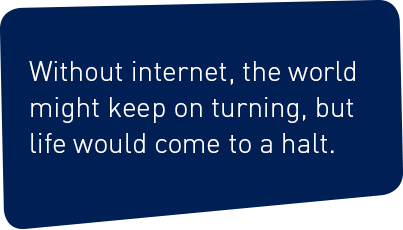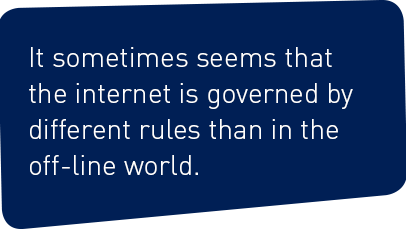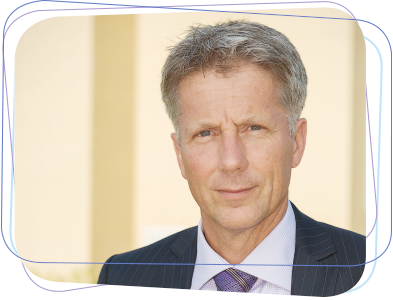Introduction
Percentage of the population
using the internet
How important is the internet?

What do we actually do on line?
In 2012, the average Dutch person spent four hours and forty-eight minutes of every working day on the internet. The amount of time spent on line was only half an hour less on non-working days. Nearly one in three Dutch people used the internet to help them decide how to vote in elections. Three quarters of them made purchases on line. For the population as a whole, the dominant activities continued to be looking up information and using e-mail. Amongst young people, however, social media interaction was equally important, along with downloading and watching films. SIDN's own research indicated that internet banking and shopping accounted for a lot of the time that people spent on line as well. SIDN uses the findings of its internet usage surveys both to shape its own policies and to support other groups, such as registrars.European internet use
Percentage of usersIs everything connected to the internet?
The internet isn't just websites and e-mail. Huge amounts of information are sent and shared on line. The internet is a vehicle for gaming, VoIP telephony, instant messaging and financial transactions. And for a host of less obvious purposes, such as the remote control of security systems and cameras, printers, TVs, doors, church bells, tidal barriers and weather stations. The internet also combines the power of countless computers, enabling them to work as oneHow secure is the internet?
Growing dependency on the internet makes security ever more important. As in the previous year, a number of data leaks received considerable media exposure in 2012. The details of more than 2,600 air travellers were accidentally disclosed. Information about hundreds of thousands of people treated at the Groene Hart Hospital in Gouda was discovered on a computer with barely any security. A piece of malware embedded on nu.nl some time before 14 March infected a hundred thousand computers. Even the White House in America was the target of a serious phishing attack. Botnets were in the news in August, when it came to light that thousands of local government computers had been ensnared by a botnet and infected with the Dorifel virus. After the Stuxnet virus in 2011, the world was hit by the Flame virus in 2012. Hackers succeeded in gaining remote control of security cameras and it was demonstrated that the flood barriers at Veere were vulnerable to malicious interference via the internet. Printers, company routers and VoIP systems were repeatedly used as unlocked back doors to gain unauthorised access to business networks. No fewer than 2.2 million Dutch people were the victims of cybercrime in 2012. TNO estimated that the total annual cost of such crime to the country was at least ten billion euros.How can we make the internet more secure?
How far are we prepared to go for internet reliability?
It sometimes seems that the internet is governed by different rules from the ones that apply in the off-line world. That's the case with crime detection and privacy, for example, and particularly with intellectual property rights. In 2012, various proposed measures aimed at tackling the abuse of intellectual property rights were shelved at the last moment. They included the Stop Online Piracy Act and the Protect IP Act, whose privacy implications and other drawbacks were regarded as unacceptable by many. In protest against the legislation, various US websites – including Wikipedia and Boing Boing – were taken down for a day. Ultimately, the bills failed to make it into law. A similar fate befell ACTA (the Anti-Counterfeiting Trade Agreement): a treaty designed to harmonise the various systems protecting intellectual property. After fierce protests, the European Union dropped the proposal.
In the Netherlands, the idea of a download ban was put forward, but this suggestion too was withdrawn after heated debate. One measure that did go ahead was the action against Pirate Bay. In 2012, all major internet service providers were ordered by a judge to prevent access to the well-known download site. This prompted vigorous debate about the role of ISPs and the value of such a blockade. SIDN believes that all stakeholders should have
